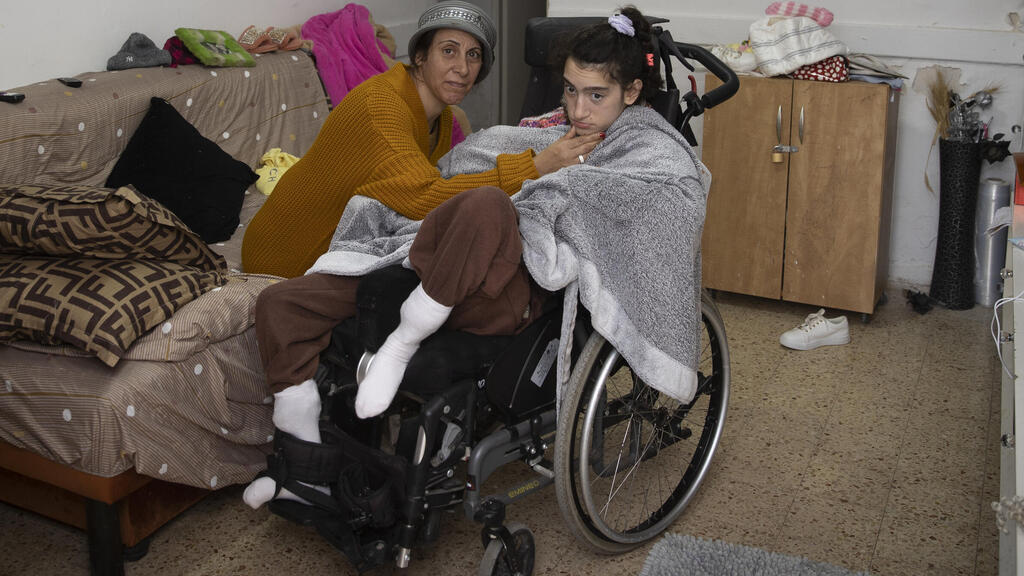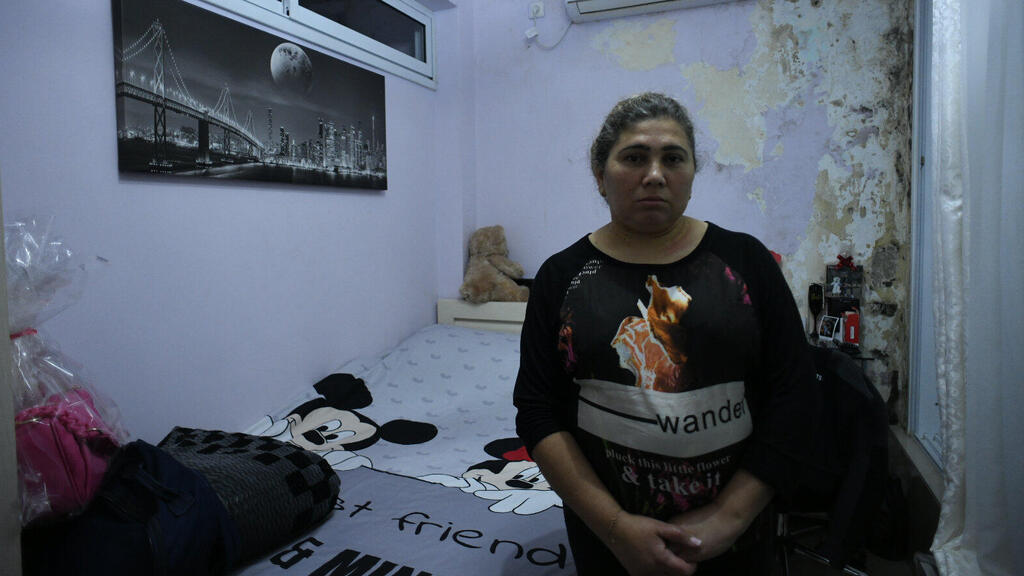Public housing in Israel is in dire straits, with residents shivering in the cold and putting buckets on the floor to collect rain water when the temperatures outside drop. With December fast approaching, public housing tenants are bracing for another winter in the cold.
Last winter, Ynet reported on Levana Dahan, 49, who lives in an public housing apartment leased to her by a state-owned housing company, Amidar, in the central city of Lod. She told us how her winter is spent shivering, clamoring to the nearest heat source, covered by blankets throughout the day, fearing that the damp ceiling would cave in at any second.
A year has passed and not a lot appears to have changed. "I have a special needs daughter," she says. "I do my best to keep her warm, but it's quite difficult. Her fever began spiking last week. I called Amidar 20 times, but no one came and I'm doing the best on my own. We can't live like this. The smell of sewage never goes away, rain water seeping in, the ceiling could be on the verge of collapse for all I know. Why does no one care?"
Ynet also covered a similar story of Stella Lebayev, a mother of four from the central city of Holon.
"We have had a leakage problem for five years," she told us last year. "It causes mold and fungi to grow on the wall. My child already has allergy problems, it's not healthy for him." Following last year's interview, representatives from the Halamish ceramics company came to repair the damage, but the repair did not last long.
"The situation remains as it was," she tells us. "When it rains, there is moisture in the walls and the paint is peeling off. We have stopped repainting it. I don't have the energy to fight this anymore. I'm exhausted. My son says he feels rain droplets coming from the ceiling."
Amidar refuses to provide data
These are not isolated incidents, but rather an ongoing phenomenon that is ubiquitous nationwide. The recent Knesset Research and Information Center study has examined Amidar activities and determined that there are less and less public housing apartments available, and maintenance levels in those leased to tenants are abysmal.
"The women in the story are just two of tens of thousands," says Dani Gighi, CEO of the Public Housing Forum. "The apartments are rundown and living there poses a real danger to people's lives."
The Knesset study has shown the number of public housing units managed by Amidar has decreased annually by 1% between 2014 and 2021, yet the quality of the apartments themselves or their maintenance has not gone up.
"This report illustrates the level of disregard that the state holds towards those who have no voice," Gighi says. "We're not building units in affluent areas at all, and completely mismanaging the units in poor areas, creating ghettos in inner cities. Those who need help the most are those the state ignores the most."
Perhaps the most outrages part about the report is the fact that Amidar appears to be laughing all the way to the bank. In the last two years, the company's profits exceeded 77,000,000 NIS. "Money is practically raining, they're handing out bonuses left and right, while cutting 25,000,000 NIS from their renovation budgets."
While Amidar have been asked to submit data about all units in their care for the past 11 years, they've declined to do so, claiming it's under the purview of the Construction and Housing Ministry. The ministry did not responded to a request for comment.
"The number of available units has decreased dramatically," Gighi says. "The troubling aspect of this is that only 7% of the funds from units sold up until 2011 has made it back to the state's coffers, so the sanctioned theft is ongoing."
From 2018 to 2020, there were 151,000 maintenance repairs orders, but only about 10% of the units had their repair calls answered.
Amidar said in response: "In the past year, we've renovated over 2,000 units, and that was possible because of our agreement with the government, which stipulates that half of our profits will be dedicated to renovations.
"Regarding the incidents in the story itself, we are familiar with this building and have invested tens of thousands in renovation already. It appears there's a stuffed drain pipe that needs to be fixed. We're sorry about this incident and it will handled appropriately."
The Construction and Housing Ministry said: "We're doing everything possible to maintain an adequate level of living in these units, and allocated targeted budgets for renovations - hundreds of those have already been completed. Since the building in Holon doesn't have a dedicated committee like most buildings do, we'll cleaned the roof and cleared the gutters so an adequate water flow can resume.
"It's worth noting that from our data, the tenant's complaints have all been recorded and handled posthaste, and tomorrow a formal representative will visit the unit to document all existing deficiencies so they can be fixed."




